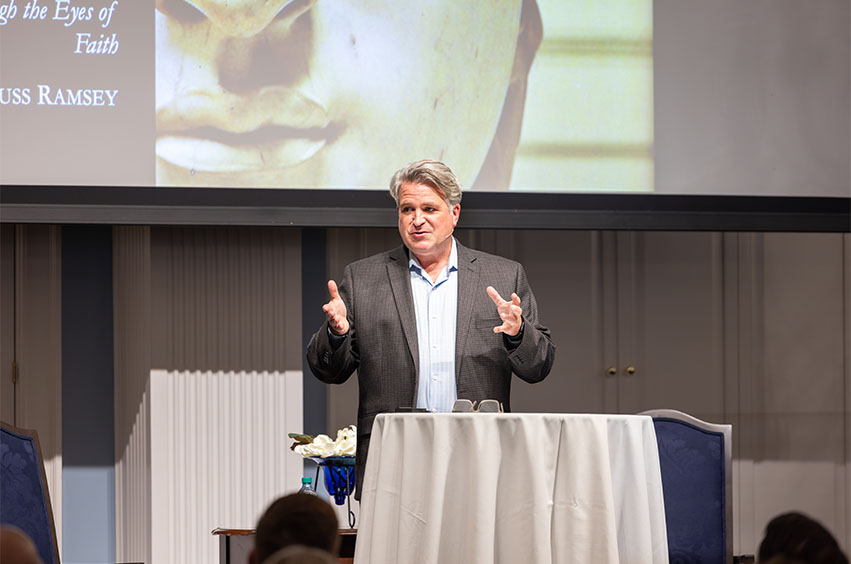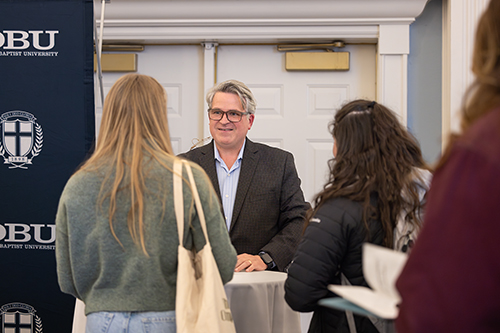DBU Hosts Russ Ramsey for the Veritas Lecture Series

DBU's Institute for Global Engagement hosted pastor and author Russ Ramsey on February 20th for the Veritas Lecture Series in the Great Hall of the Mahler Student Center. The event began with a brief introduction from DBU President Dr. Adam C. Wright and the Executive Director for the Institute for Global Engagement, Jonathan Fechner. Mr. Ramsey presented a lecture titled Pursuing Perfection: Michelangelo's David and Our Hunger for Glory, followed by a conversation with Dr. Brent Taylor, Senior Pastor of First Baptist Church at the Fields.
Ramsey began his lecture by making a bold claim: "Michelangelo's David is the single greatest artistic achievement by an individual in the history of humanity." He acknowledged the audacity of this statement but challenged anyone to disprove it. The lecture explored why David stands apart from other artistic creations. Unlike paintings, where artists can build and correct their work, sculpting from a single block of marble requires a relentless process of subtraction—one mistake, and the masterpiece is compromised. Michelangelo's sculpture, carved from a monolithic stone, shows an unparalleled understanding of human anatomy and artistic precision. The fact that David remains unchallenged in perfection, even after centuries, underscores its significance.
The evening's discussion was not solely about David's artistic mastery but also about its deeper implications. The story of David—from its origins as an abandoned block of marble to its transformation under Michelangelo's chisel—mirrors human life itself. Just as Michelangelo had to work within the limitations of the stone, so too do individuals navigate the constraints and influences that shape their existence.
The lecture delved into the biblical story of David and Goliath; the moment of confrontation immortalized in Michelangelo's sculpture. Capturing the instant before David's battle, Michelangelo presents the young warrior in a stance of confidence and readiness. Every detail, from his tense posture to the cleverly hidden sling, narrates a tale of strategy over brute force, faith over fear.
Furthering this analysis, the talk explored the inherent limitations that define both artistic endeavors and human life. Michelangelo did not have a perfect, untouched slab to work with; rather, he had to adapt to previous sculptors' failed attempts. Ramsey compared this to life and ministry by stating, "We work with what we're given, and we live in a world of limits, and we work with things and ourselves included, that others have already had a hand in shaping." Yet, rather than being purely restrictive, limitations can also foster creativity, resilience, and deeper communal connections.
The lecture portion closed on a poignant note: David has stood tall for over 500 years, but even he bears cracks in his ankles—a metaphor for the endurance of beauty despite fragility, leaving the audience with a renewed appreciation not only for Michelangelo's genius but also for how creativity, perseverance, and faith intersect in both art and life.
After Ramsey concluded his lecture, he sat down with Dr. Brent Taylor, DBU Trustee, and Senior Pastor of First Baptist Church at the Fields. The discussion centered on the intersection of art, suffering, and faith, where Ramsey emphasized the transformative power of beauty and its role in spiritual life.
Ramsey's books explore the lives of famous artists, revealing how their struggles and creative works reflect deeper truths about the human condition and the grace of God. "A lot of the world's greatest art is born out of deeply profound experiences of suffering and loss," Ramsey explained. He noted that while Christians often focus on truth and goodness, beauty is equally essential to understanding God.
During the conversation, Ramsey challenged the Western tendency to prioritize efficiency and productivity over contemplation and wonder. He encouraged attendees to slow down and intentionally engage with beauty, whether through art, music, literature or simply observing a sunset. "When we engage with beauty, we're training ourselves to experience awe and longing—practices that prepare us for eternity," he said.
The conversation with Dr. Taylor also touched on the complexity of artists' lives, including figures like Caravaggio, Rembrandt, and Van Gogh, whose personal struggles did not negate the spiritual depth of their work. Ramsey argued that their stories challenge common assumptions about grace and redemption, prompting deeper reflection on how faith intersects with brokenness.

As the discussion concluded, Ramsey urged Christians to resist the cultural pressure of constant striving and instead cultivate a sense of wonder. "In the presence of the Lord, we won't be working to build significance for ourselves," he said. "We will be worshiping with all of eternity ahead of us, and nobody in a hurry."
Ramsey's thought-provoking talk left attendees with a renewed appreciation for the role of beauty in faith and the invitation to slow down and notice the world around them.
The student body also had the opportunity to hear Ramsey speak in chapel on Friday, February 21st. Drawing from 2 Timothy 3:14-17, he encouraged students to immerse themselves in God's Word. Emphasizing the importance of engagement with Scripture, he stated, "Scripture is given to us by God so that we might know Him, but it calls for our interaction with it."
Russ Ramsey grew up in the fields of Indiana. He studied at Taylor University and Covenant Theological Seminary, where he received a Master of Divinity and a Master of Theology degree before becoming a pastor. He and his family live in Franklin, Tennessee, where he serves as pastor at Christ Presbyterian Church. Russ is the author of Rembrandt is in the Wind: Learning to Love Art through the Eyes of Faith and Van Gogh Has a Broken Heart: What Art Teaches Us About the Wonder and Struggle of Being Alive.
The DBU Veritas Lecture Series brings thought leaders and industry professionals to discuss difficult issues on the Hill. Controversial and challenging topics often go unaddressed, but this event creates an environment for DBU students to participate in a dialogue with the professionals who are leading the change.








